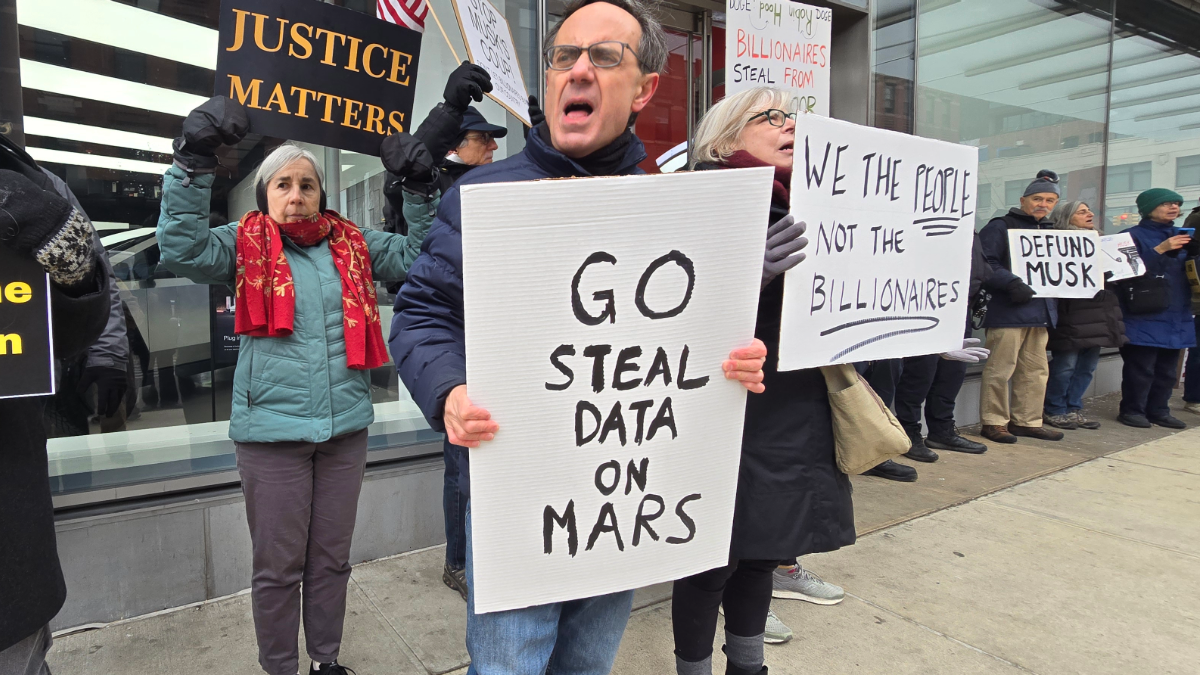The New Surveillance State: Why Data Privacy Is Now Essential to Democracy
Laura MacCleery / Jun 20, 2025
February 15, 2025—Demonstrators gather outside the Tesla showroom in Manhattan, holding signs and engaging in chants protesting Elon Musk, DOGE, and the influence of tech billionaires. Justin Hendrix/Tech Policy Press
The Department of Government Efficiency (DOGE) was sold to the American people as a cost-cutting initiative. Instead, it is clearly something far more sinister: a sprawling data-harvesting operation that threatens the constitutional foundations for American democracy.
Revelations about DOGE's sweeping access to government data shows the administration views personal information as a means of concentrating political power. An early shock came when a National Labor Relations Board whistleblower alleged DOGE operatives conducted systematic “exfiltration” on huge amounts of sensitive government data. A staffer for the US House Oversight Committee alleged that these data practices violated US privacy and cybersecurity laws and likened them to “tactics used by adversaries waging an attack on US government systems.”
The end-game is reportedly a "master database" combining information from the Social Security Administration (SSA), Internal Revenue Service (IRS), Department of Homeland Security (DHS), and health agencies, as well as voting records. As a senior DHS official told the tech news publication, Wired, “[t]hey are trying to amass a huge amount of data. It has nothing to do with finding fraud or wasteful spending.”
Meanwhile, key offices that had protected against data misuse have been gutted, including DHS's Office for Civil Rights and Civil Liberties (CRCL). While this is horrifying enough, it is, evidently, just the beginning. When combined with data from private brokers that sell information on us and our online habits, the amount of information available for government misuse is staggering.
Yet last week, in a three-paragraph, unsigned order decided 6-3, conservatives on the Supreme Court allowed the pillaging of Social Security data by DOGE (which includes “medical and mental health records” and other private information) to continue. Justice Ketanji Brown Jackson’s dissent blasted the decision writing that the “the court has truly lost its moorings" and is creating "grave privacy risks for millions of Americans."
Against the backdrop of fired inspectors general — the experts on combatting government waste — the DOGE approach eviscerates basic audit principles. No legitimate auditor ever gets direct access to backend data systems because it clouds the data trail by allowing potential data manipulation, destroying the audit’s integrity. Proper auditing requires clear documentation of every time data are accessed, when, and why. DOGE's unfettered approach and murky purposes make such oversight essentially impossible. It appears that destruction of accountability — rather than the creation of it — is the goal.
DOGE’s next apparent step is the weaponization of data against particular groups of people, as seen in the aggressive targeting of housing, tax, and food assistance records for immigration enforcement. The latest betrayal is that the Centers for Medicare and Medicaid Services has shared information with DHS on applicants, including from California, Illinois and other jurisdictions, reportedly as part of an aggressive push to identify immigrants, though the choice of states appears political.
Any one of these actions is unprecedented and legally contestable. For example, following the Nixon administration's weaponization of tax data against political enemies, the Tax Reform Act of 1976 made tax records confidential by default. Since then, Congress has repeatedly affirmed that tax records are not available for immigration enforcement, as 105 Democratic members of the House explained last month in an amicus brief challenging a data-sharing agreement between DHS and the IRS.
This is particularly insidious because the government is playing gotcha with data provided by individuals and families in good faith. Housing assistance applications, tax filings, and health records were submitted for a single purpose under specific legal frameworks. Now they are being used against them, without consent.
Such traps and double binds are inimical to democracy. Defending the Constitution's ex post facto clause, Alexander Hamilton wrote in the Federalist No. 84 that: “[t]he creation of crimes after the commission of the fact, or . . . punishment for things which, when they were done, were breaches of no law, and the practice of arbitrary imprisonments, have been, in all ages, the favorite and most formidable instruments of tyranny.”
When the government can track where you go, whom you associate with, and what you spend your money on, it violates the Fourth Amendment. It also chills First Amendment freedom of expression, undermines your freedom to travel, and destroys what Justice Louis Brandeis famously called “the right to be left alone” — the fundamental privacy right that underlies American liberty.
The advent of artificial intelligence to analyze reams of data brings further risk that conclusions will be biased, inaccurate, or uninformed by context. We have already seen how the ridiculous attempts to track DOGE’s cost-cutting bore no relationship to budgetary reality. But even when it is effective, AI in the hands of a weaponized government could be dangerous, enabling governments to micro-target highly persuasive messages to sell their preferred policies.
We can meet this moment by looking to democracies abroad that have found workable solutions. Surprisingly, Estonia, often called the world's most digitally advanced democracy, built its government infrastructure around the principle that citizens control their data in response to its experience with autocracy. Every Estonian has a digital identity that allows them to access government services securely, and can see who accessed their information, when, and why. Government agencies are barred from sharing data without explicit citizen consent or a court order.
Estonia proves that efficient government and strong privacy protections are not mutually exclusive. While imperfect, their system processes everything from voting to tax filing with stringent safeguards and citizen oversight. Most importantly, its data architecture is designed to prevent mass surveillance.
Privacy technologies also offer solutions. For example, computers can be trained to perform calculations on encrypted data without ever decrypting it. Another system, called multi-party computation, allows multiple agencies to analyze data while keeping the information secure. Government systems should be built with "privacy by design," embedding basic protections in the technology.
Strong legal frameworks are needed as well. Both data minimization requirements and purpose limitations would ensure that agencies can collect information only when necessary and that the government cannot repurpose data to adversely affect people. Everyone should also have a right to know when their data is being used, and for what purpose, and be empowered to seek redress for privacy violations. While we await an opportunity for reforms at the federal level, state constitutions and laws could be a critical new bulwark against abuses by the federal government.
The American people never voted for a surveillance state. The truth is now unavoidable: data privacy and ownership are fundamental preconditions for a functioning democracy. We can continue allowing the government essentially unlimited access to our most private information, or we can build systems that protect and support our constitutional freedoms. The fight for our rights in our digital age begins with recognizing that we can have both efficient government and strong privacy protections, but only if we act before a fast-moving surveillance infrastructure becomes too entrenched to dismantle.
Authors
